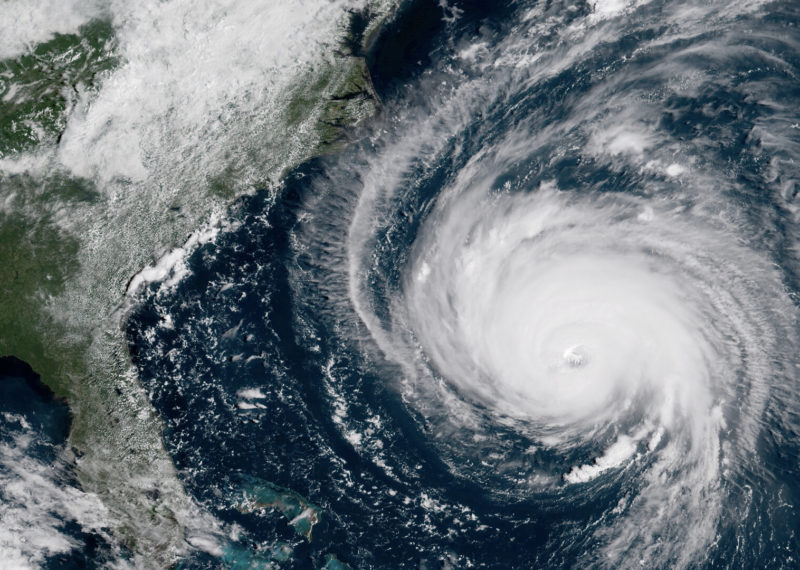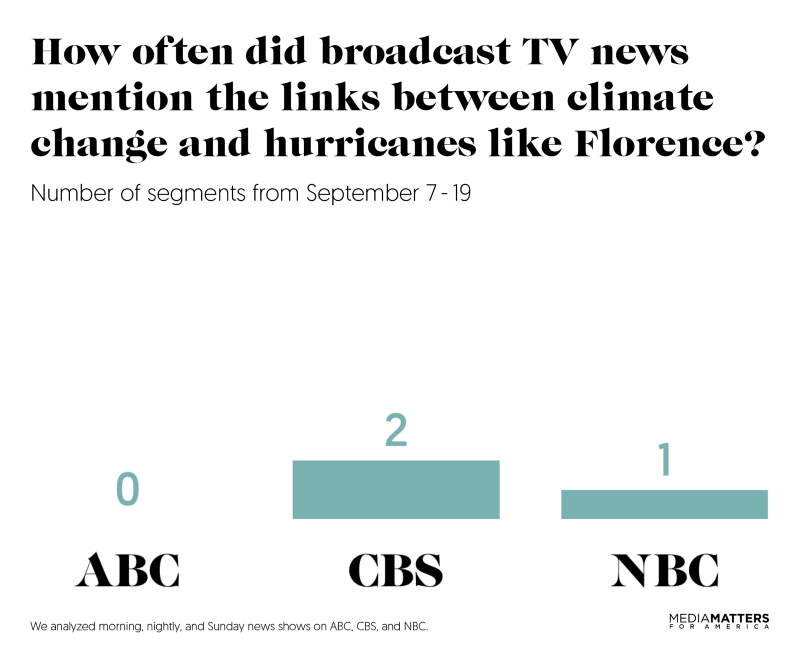In the lead-up to Hurricane Florence, conservative firebrand Rush Limbaugh griped about weather reporters for drawing a link between climate change and the storm. “Hurricanes and hurricane forecasting is like much else that the left has gotten its hands on, and they politicize these things,” he said. Limbaugh isn’t alone. Senior officials in the Trump administration have repeatedly chastised reporters for talking about climate change in the midst of a natural disaster, and more than a few are taking the hint.
TV news outlets scarcely mentioned climate change in their coverage of Hurricane Florence, a storm made dramatically worse by rising temperatures. While that may seem politically safe, the people who lived through the storm want a different approach. A new poll finds that North Carolina voters are concerned about climate change and believe that reporters should cover the issue. In the future, broadcast journalists might take a cue from their viewers.
More than 60 percent of North Carolina voters are worried about climate change, and some 55 percent say it is appropriate to talk about the issue when disaster strikes, according to the poll, which was carried about by researchers from Yale University, George Mason University and Climate Nexus.
“Contrary to arguments made by some politicians that it’s ‘too soon’ to talk about the links between climate change and extreme weather during or immediately after a disaster, this study finds that most North Carolina voters want the media to talk about these connections in real time,” said Anthony Leiserowitz, director of the Yale Program on Climate Change Communication.
A clear majority of North Carolina voters think climate change affected the volume of rainfall during Hurricane Florence, a view that is supported by research. Most also believe that climate change is making hurricanes and floods worse, views that are similarly consistent with climate science.
The issue is highly polarized, which may discourage reporters from covering it. The North Carolina poll shows a yawning divide between Republicans and Democrats — Democrats are more likely to worry about climate change and more likely to believe it played a role in Hurricane Florence. A new study finds that, while extreme weather will do little to alter political beliefs, political beliefs can radically alter views of extreme weather.
“This research shows people’s perception of extreme weather can be processed through partisan lenses,” said Ben Lyons, a University of Exeter sociologist, and lead author of the study. “This means efforts to connect extreme events with climate change may do more to rally those with liberal beliefs than convince those with more conservative views that humans are having an impact on the climate.”
This fact shouldn’t scare reporters. Lyons said the public is responsive to coverage of exceptionally severe weather events. “Very extreme weather accompanied by constant media coverage is harder for people to deny,” Lyons said. “Particularly intense events — a 100-year flood or catastrophic hurricane — might be most capable of influencing attitudes.” Hurricane Florence offered a prime opportunity to educate the public about climate change — one that was largely squandered by broadcast news outlets.
A few days before the storm hit North Carolina, President Trump said locals “haven’t seen anything like what’s coming at us in 25, 30 years, maybe ever. It’s tremendously big and tremendously wet. Tremendous amounts of water.” It is striking that a president known for his bravado and bluster managed to undersell the storm. Florence broke all-time rainfall records in North Carolina by several inches.
When the weather breaks records, climate change is usually part of the story. Many people understand this, and they expect news outlets to explain how carbon pollution is fueling more severe storms, like Hurricane Florence. Next time, TV reporters might take the cue.
Disclosure: Climate Nexus and Nexus Media are both affiliated with Rockefeller Philanthropy Advisors. Jeremy Deaton writes for Nexus Media, a syndicated newswire covering climate, energy, policy, art and culture. You can follow him @deaton_jeremy.



